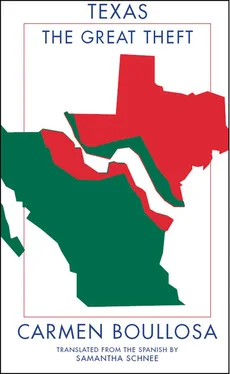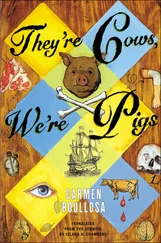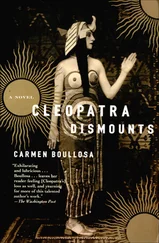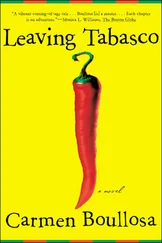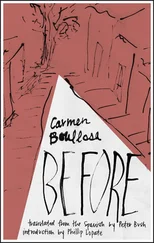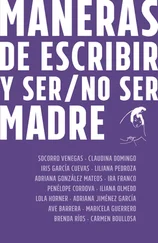Favorita has shiny eyes and tiny pupils, she’s the cleverest pigeon; nothing distracts her. On Favorita’s foot Shears’ phrase crosses the river, over the levees, over Fort Paredes and its casemate, over the moat and the sentry boxes, all of which Matasánchez had built to try to keep the prairie Indians, the mercenaries, the pirates, and the river at bay. She arrives in the center of the town where Don Nepomuceno is so deeply and widely respected, and alights on the eaves of the courtyard behind Aunt Cuca’s house, where the other Rodríguez, Nicolaso’s brother Catalino, keeps Matasánchez’s dovecote.
Favorita is their favorite for good reason. Without entering the dovecote, she pecks on the door, which rings the bell. Catalino takes the message from her and, her work done, Favorita enters the dovecote. Catalino takes the message to the central patio.
The sun above Matasánchez is the same one that’s roasting Bruneville.
In the middle of the courtyard Catalino Rodríguez reads the message aloud for all to hear, including:
1Aunt Cuca (who is crocheting in her rocking chair on the balcony outside the living room).
2The women in the kitchen (who are making tamales; two of them are kneading the hominy while one of them adds small pats of lard, until it makes a paste with the maize flour that they use as a base, while Lucha and Amalia cut the banana leaves that they’ll roast over the fire).
3Doctor Velafuente (who’s in his office).
4And his patient (whose name we can’t reveal because he was seeing the doctor for a malady he picked up in an encounter off a noisy street in New Orleans, where he should never have set foot, but the deed is done).
Aunt Cuca sets her crocheting aside, puts on her shawl and goes to tell her godmother the news. Lucha and Amalia leave the kitchen on an urgent trip to the market: “We’re just going to get another quarter-ream of banana leaves, there aren’t enough for the tamales.” Doctor Velafuente ends his appointment; the patient leaves quickly for the church and the Doctor heads to the arcade. Each of them will go spread the word about how the Sheriff has insulted Don Nepomuceno.
The news is like a bomb going off in Matasánchez. The city wonders, How could a dirtbag like Shears (who was nothing more than a carpenter’s apprentice, and a bad one) speak like that to Don Nepomuceno?
But this general sentiment doesn’t mean that people don’t have bones to pick with Nepomuceno.
The old ladies who attend mass every day, shrouded in black, pray for Nepomuceno but wonder if the insult might be punishment “for doing things that embarrassed Doña Estefanía”; they haven’t forgiven him for romancing the widow Isa sixteen years ago when he was fifteen, or for the way his marriage to his cousin Rafaela ended (he had agreed to it reluctantly, only to please his mother). When Rafaela died in childbirth they blamed him: “How could she have survived the ordeal with her broken heart?” (Some people swore that she hadn’t been kissed during the entire marriage, and that Nepomuceno did it to her quickly just to get her with child. Although others said — out of maliciousness, no doubt — that she had already been with child when they wed.) Nor had they forgiven him for his subsequent marriage to his former lover, Isa, the widow who bore him his first daughter (they’re still married); nor for the other dalliances people whisper about on the way out of mass.
On the other hand, everybody was full of sympathy and compassion for Lázaro, Shears’ victim: an old vaquero who could no longer rope or keep up with the cattle, though he could still play the violin beautifully — they’d invited him to play at baptisms but he refused to cross the river. He’d been around forever — grew up in Matasánchez till he was taken north while still just a child, violin in hand, not knowing how to rope cattle; they said that his aunt sold him to the Escandón family, ranchers who gave him to their cousins. Later, Doña Estefanía would brag about how well the boy roped cattle and how he could sing and play, too.
Jones, a runaway slave, is leaning against the (so-called) cathedral portico, frightened by the news he overheard while selling candles and soaps from his basket. He leaves his spot and goes from house to house with his soaps and the gossip, heading toward the Franciscan monastery, always adding something along the lines of, “Like it or not, that’s how they are; they don’t know what respect is,” in his excellent, newly learned Spanish.
He knocks on the Carranzas’ door to offer his wares and deliver the news, which causes quite a commotion. The boy of the house, Felipillo Holandés — whom the Carranzas adopted not knowing he’s a Karankawa — is overcome by a dark melancholy that he cannot explain to anyone; it’s like he’s lost the ground beneath his feet.
Then Jones delivers the news to the house next door, where Nepomuceno is practically a god. “Don’t let Laura hear!” But Laura, only a few months older than Felipillo Holandés, has already heard. Angry tears begin to pour from her eyes: how could someone dare insult her hero, her savior, the man who rescued her from captivity?!
Don Marcelino, who rises at dawn every day of the week, including Sundays, to search for plant specimens for his herbarium (“that crazy old plant man,” as the old women and children call him) is returning to Matasánchez from a two week expedition when he hears the news. It’s only half-translated and the “Shut up” part’s been run together. He immediately takes a piece of paper from his shirt pocket and writes with a sharp-tipped pencil, “ shorup : used to order someone to be quiet. A scornful command.” He thinks it’s a Spanish word. He collects words the same way he collects plants.
Later Don Marcelino folds the paper and puts it away next to his pencil, careful to put the tip up so it doesn’t become dulled. He goes inside his house. He removes his boots just past the front door and doesn’t give the subject another thought.
Petronila, a vaquero ’s daughter — she was conceived on Rancho Petronila, hence her name — is standing on her balcony when she hears the news. She goes inside, puts on a shawl, (although it’s hot outside, that’s what decent women do, otherwise her neck would be exposed; at home she leaves her head uncovered) and goes out shouting to her friends, “The Robin brothers are coming!”
The legend of these handsome bandits has been passed from señorita to señorita. The brothers are the Devil incarnate: the most terrible threat, and the most hoped-for.
In the street, Jones sees his friend Roberto, one of the Negroes who escaped when Texan landowners fled to Louisiana before the battle of San Jacinto (they dropped everything and ran for their lives, absolutely terrified, shouting “The Mexicans are coming!” The slaves took advantage of the chaos, “Let’s scram!”, and escaped).
“Roberto, come here! I have to tell you something …”
No sooner does he hear what Shears said than poor Roberto breaks out into hives. The Mexicans had welcomed him with open arms. But now the gringos are getting bolder, perhaps they will cross the Río Bravo to capture fugitives? It had already happened once before, when the mayor locked some escaped slaves in the town jail to protect them, but now things aren’t the same because Nepomuceno and the mayor have their differences, and no one is going to come to their rescue. Ouch, his hives! His skin is covered in tiny red bumps. He begins to scratch and can’t stop.
At the arcades, while having his shoes shined, Doctor Velafuente tells the bootblack, Pepe; then he tells the tobacconist when he stops in to pay for his snuff; at the post office he announces the news loudly to Domingo, who seals the letter the Doctor sends to his sister Lolita every week; and on Hidalgo Street he repeats it to Gómez, the mayor’s assistant, whom he runs into when he’s deciding whether to follow his routine and go to the café, or go to the barber (where Goyo recently cut his hair), or even go home (but it’s too early, the news is really messing up his daily routine). All he really wants to do is get on board the White Lily (the one luxury in his life, his fishing boat), but “that would be irresponsible.”
Читать дальше
